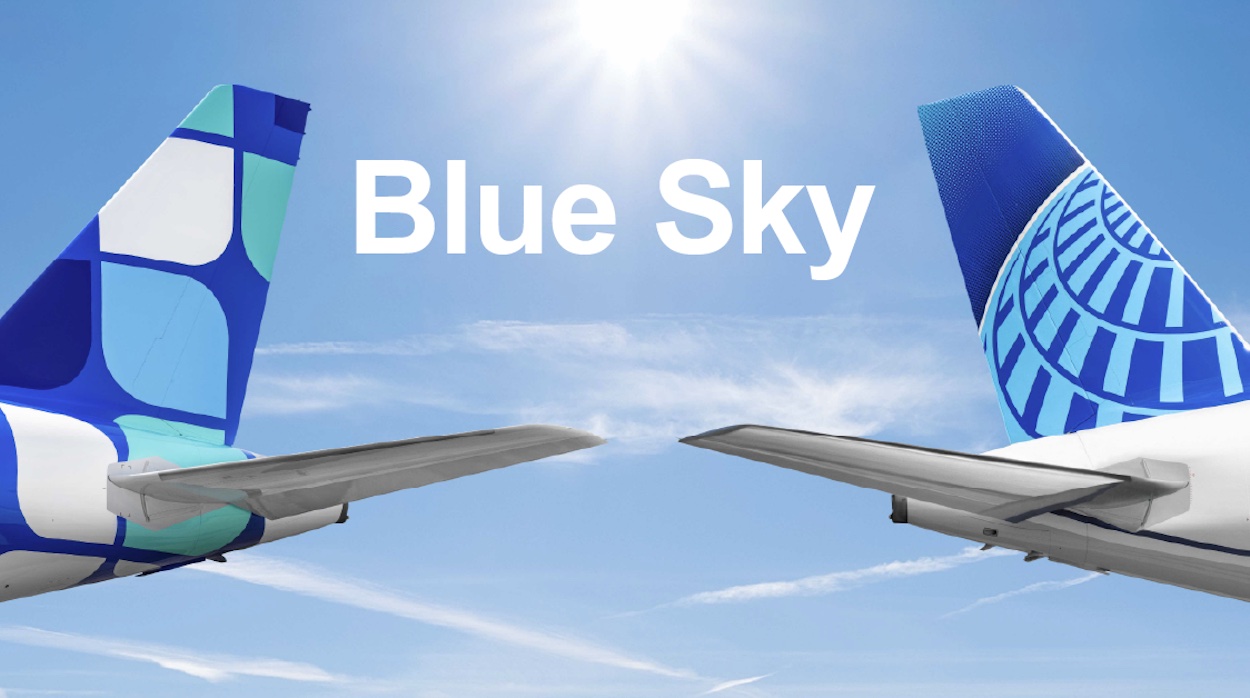
JetBlue and United have received approval from the Department of Transportation to move ahead with their Blue Sky collaboration, offering new loyalty perks and booking flexibility.
United and JetBlue Gain DOT Approval for Blue Sky Collaboration
JetBlue and United Airlines announced on July 29, 2025, that the U.S. Department of Transportation has completed its review of their joint initiative called Blue Sky. That means the collaboration can now proceed toward phased implementation starting this fall.
Here are the key customer benefits Blue Sky will deliver:
- Mileage and Points Earning: United MileagePlus members can earn and redeem miles on most JetBlue flights, and JetBlue TrueBlue members can earn and redeem points across United’s domestic and international network.
- Cross-Booking Capability: Flights from both airlines will be bookable on each other’s websites and mobile apps via an interline agreement.
- Reciprocal Loyalty Perks: Members will receive benefits like priority boarding, preferred or extra-legroom seating, complimentary checked bags, and same-day standby or flight change options when flying either airline.
- Slot and Terminal Access: JetBlue will provide United with up to seven daily round-trip slots at JFK Terminal 6 beginning “as early as” 2027 (that’s quite a wait…). The two carriers will also exchange eight slot pairs at Newark Liberty International Airport.
- Ancillary Integration: United will migrate its third-party travel services (hotels, rental cars, cruises, and insurance) to JetBlue’s Paisly platform for a unified booking experience.
Marty St. George, JetBlue’s President, touted the pivot of United to JetBlue’s Paisly platform:
“We believe Blue Sky will enable each airline to offer its customers access to hundreds of new flights and destinations through a traditional interline agreement, with the opportunity to earn and redeem loyalty points and miles across each other’s networks. United has agreed to transition its distribution of non-flight ancillaries such as hotels, rental cars, and more to our travel products subsidiary Paisly – turbocharging Paisly’s high-margin growth.”
The news comes as JetBlue revealed a 2025 Q2 loss of $0.21 per share and a 3% decline in revenue versus the same period in 2024, with operating expenses down only 0.9%.
Both airlines emphasized that they will remain independent carriers with separate schedules and pricing structures. The Blue Sky collaboration is not a merger or codeshare agreement, but a loyalty- and booking-focused partnership designed to enhance customer experience without limiting competition.
United stated that the partnership is expected to generate approximately $50 million in incremental annual profit. Both United and JetBlue expressed gratitude to the Department of Transportation (DOT), particularly Secretary Sean Duffy and the review team, for completing the regulatory process.
> Read More:New JetBlue – United “Blue Sky” Partnership Includes JFK Slots, Reciprocal Loyalty Perks
CONCLUSION
With regulatory clearance secured, United and JetBlue will begin rolling out the Blue Sky partnership in phases this fall. Travelers will gain access to a broader network, more earning and redemption options, and cross-airline perks while retaining the benefits of each airline’s independent identity. This partnership could meaningfully reshape the loyalty landscape without the baggage of a formal merger…but we’ll have to wait and see for now.




As I said on another platform, this is just icing on the cake.
For long term survival, B6 needs membership in Star which UA has veto power as a founding member. With membership, B6 could handle the domestic leg of Star airlines at JFK and BOS providing necessary incremental revenue and enhancing the value of TrueBlue.
Plan B would have Luft Group buy a portion of B6 as a footprint into North America as it has done with it Euro expansion via ITA and AirBaltic.
With Scott Kirby having gone out of his way to kiss Trump’s butt and do all but pour the orange guy’s morning coffee, there should be no surprised this was approved. Whether or not this really benefits NYC area travelers long term, I have my doubts.
You are so right on so many levels. Funny that B6 and UA is ok with the government but the AA and B6 is not ok.
So did Bezos, Zuckerberg and a host other bigwigs. It’s all about political maneuvering and posturing. Blue Sky would be more beneficial to the traveling public especially the very busy NE corridor rather than the very monopolistic NE alliance with AA, who already has a fortress hubs in PHL & DCA and a very large presence in LGA, JFK & BOS.
and yet the Trump DOT slapped EWR w/ capacity restrictions that cost UA 15% of its EWR flights and handedly made DL the largest airline in NYC.
Successful influence doesn’t give your competitor a 50% advantage in the domestic market, a share advantage overall, and 33% more flights
It would be nice if JetBlue got access to UA’s lounges, since it’s sadly lacking in that department other than the hope of JFK and BOS lounges.